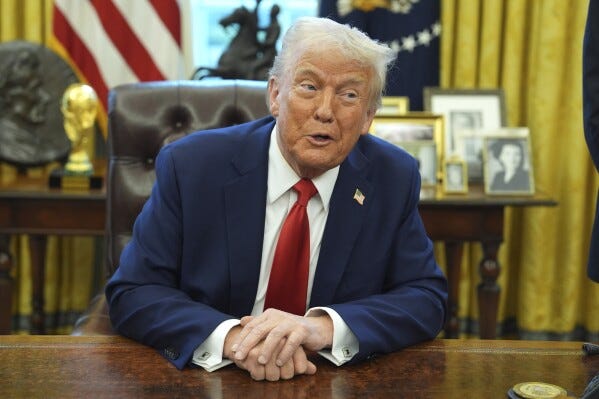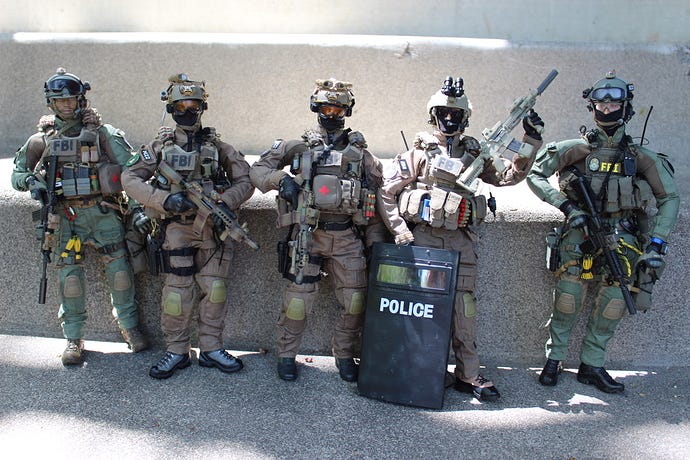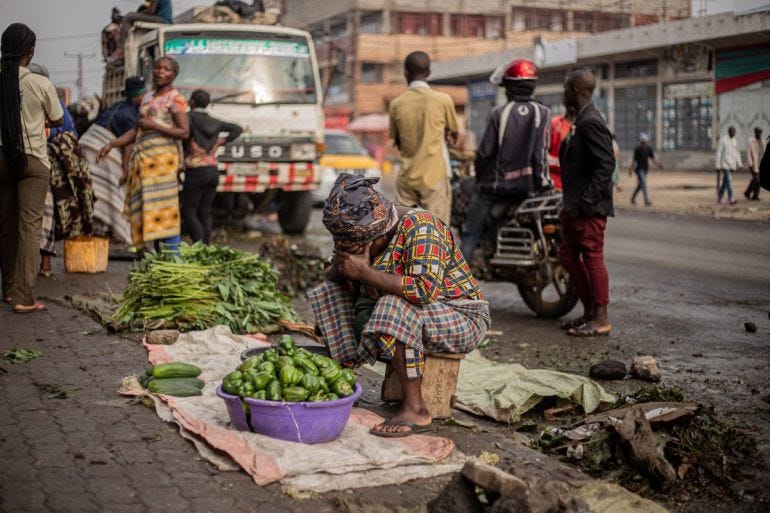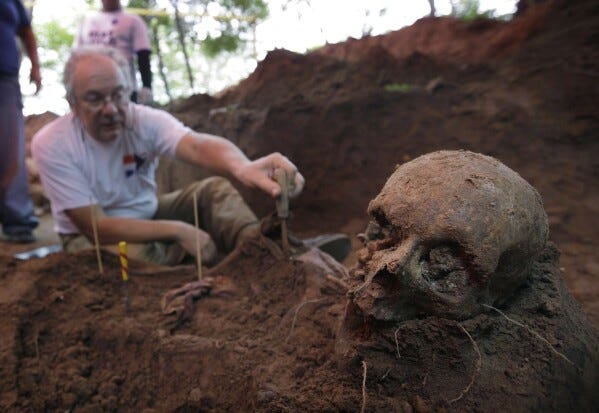New Jersey Governor Threatens Feds, US Create Oil Shortage in Canada? Americn Government Buys TikTok? Rwandan/Congolese War Causing Starvation (The Five for 02/04/25)
Hey, welcome to The Five, a publication about the stories that matter.
Let’s dive into the news.
[one]
Uhh…wut?
President Trump signed an executive order to [checks notes] have the U.S. Government buy TikTok?!
President Donald Trump on Monday signed an executive order directing the U.S. to take steps to start developing a government-owned investment fund that he said could be used to profit off of TikTok if he’s successful at finding it an American buyer.
Trump signed an order on his first day office to grant TikTok until early April to find an approved partner or buyer, but he’s said he’s looking for the U.S. to take a 50% stake in the massive social media platform. He said Monday in the Oval Office that TikTok, which is owned by China-based ByteDance, was an example of what he could put in a new U.S. sovereign wealth fund.
“We might put that in the sovereign wealth fund, whatever we make or we do a partnership with very wealthy people, a lot of options,” he said of TikTok. “But we could put that as an example in the fund. We have a lot of other things that we could put in the fund.”
Sovereign wealth funds invest in assets, such as stocks, bonds and real estate. They are typically funded by a country’s budgetary surpluses, which the U.S. currently does not have.
Trump noted many other nations have such investment funds and predicted that the U.S. could eventually top Saudi Arabia’s fund size. “Eventually we’ll catch it,” he promised.
Well…I didn’t see that one coming.
[two]
Phil Murphy, Governor of New Jersey, claims to be harboring an illegal immigrant “above his garage” at the moment, according to a clip aired by Fox News.
Tammy and I were talking about, I don't want to get into too much detail, but there's someone in our broader. Universe whose immigration status is not at the point that they are trying to get it to. And we said, you know what? Let's have her live at our house above our garage.
Uh, and, and good luck to the feds coming in to, to try to get her
For context, here’s the FBI’s Hostage Rescue Team (HRT) that the 60something with a gut and donning boat shoes thinks he’s going to hold off…who are you placing your bet on?
While I generally support federalism (the balance of power between the local, state and national governments), I’m somewhat concerned about escalation here. Governor Murphy’s primary concern doesn’t seem to be the immigrant, as he said exactly where she’s at.
He seems to WANT to get raided for the media attention. Maybe that’s a well intentioned move on his part…but whenever you summon a SWAT team, there’s always the chance an innocent person gets killed in the chaos.
[three]
After a lot of online drama yesterday, the American/Canadian trade war seems to be off, according to Canadian President Justin Trudeau, who posted to X:
I just had a good call with President Trump. Canada is implementing our $1.3 billion border plan — reinforcing the border with new choppers, technology and personnel, enhanced coordination with our American partners, and increased resources to stop the flow of fentanyl. Nearly 10,000 frontline personnel are and will be working on protecting the border.
In addition, Canada is making new commitments to appoint a Fentanyl Czar, we will list cartels as terrorists, ensure 24/7 eyes on the border, launch a Canada- U.S. Joint Strike Force to combat organized crime, fentanyl and money laundering. I have also signed a new intelligence directive on organized crime and fentanyl and we will be backing it with $200 million. Proposed tariffs will be paused for at least 30 days while we work together.
The dirty little secret here is that Canadian oil passes through the U.S., and Trump could technically shut it down.
The Not So Secret Podcast posted to X on how that can happen:
- The Energy East Pipeline Cancellation: Canada's decision to cancel the Energy East pipeline due to “climate change“ left Eastern Canada dependent on the Enbridge Mainline, which runs through the U.S. This means Canadian oil must pass through American territory to reach its own eastern markets. The Enbridge Mainline system, which includes the Lakehead System or U.S. Mainline, runs through approximately 1,900 miles of the United States.
- Strategic Tariffs: Trump’s tariffs on Canadian oil is not just as a way to protect U.S. industries but is a strategic leverage point. Knowing that Canada has limited options for its oil transport, these tariffs will force Canada into negotiations or concessions.
- Economic Pressure: By making Canadian oil more expensive or less accessible in Eastern Canada, Trump is also aiming to pressure Canada economically. This will lead to higher domestic energy prices in Canada, influencing public opinion and policy decisions in Ottawa.
- Security and Sovereignty: This move is also a reminder of U.S. influence over Canadian energy security. By controlling part of Canada's oil pathway, the U.S. Is going to exert influence over Canada's energy policy and, by extension, its sovereignty in energy matters.
Admittedly, I find it pretty hard to swallow that the U.S. would intentionally skyrocket the price of gas on the everyday citizens of one of our closest allies (who only thought planned to invade us once—in the 1920’s). On the other hand, more Americans have died of Fentanyl overdoses than the number of Americans killed in combat in all post-WWII wars.
And Trump’s relationship with Mexico once seemed to be irreparable, but Mexican President Claudia Sheinbaum just moved 10,000 troops to the US/Mexico border this week.
I would argue that we share more in common, in terms of culture and values, with Canada and Mexico than we do with The U.K. and Germany (the nations most Americans immigrated from), so hopefully these relationships are restored.
[four]
As the Congo is torn apart by Rwandan-backed militias, people in the Congolese city of Goma are facing starvation, inflation and dramatic food shortages.
The cost of some essential food items has more than doubled in Goma, the main city in eastern Democratic Republic of the Congo (DRC) that was captured by M23 rebels last week, according to locals and an NGO.
As a result of the soaring costs and worsening displacement crisis, basic nutrition is out of reach for many, and hundreds of thousands of people in the city could be pushed into severe hunger, according to anti-poverty NGO ActionAid.
Collecting data from three Goma markets – Virunga, Lenine and Kituku – the organisation’s staff reported price hikes on some food items, including flour, beans and oil, of between 18 and 160 percent from January 25 to January 31
On the night of January 26, Rwanda-backed fighters from the March 23 Movement (M23) stormed into Goma, declaring it under their control. There was sporadic fighting between the rebels and Congolese forces in the days that followed with electricity, water and internet services cut, and businesses shut.
More than a week later, power has largely been restored and food products are available in the city, locals in Goma told Al Jazeera. But they also confirmed the prices of several items had doubled or even tripled since the takeover.
“I’m asking the new authorities to do everything they can to stabilise the situation here,” Julienne Anifa, a mother of seven shopping at the Alanine Market in Goma, told Al Jazeera over the weekend. “We buy various products at a high price. And this is affecting us economically at this time of war.”
I rarely ask the readership to donate to something…but if you have interest in helping out, my family will be donating through World Vision, a nonprofit I have worked with pretty extensively when I was in media.
And finally, decades after a dictator was forced out of power (by getting couped by his in-law), the citizens of Paraguay are are mounting an effort to recover the bodies of those executed by the dictatorship.
Despite being ousted in 1989 after a 35-year reign of terror, during which 20,000 people were tortured, executed or disappeared, some Paraguayans feel as if Gen. Alfredo Stroessner never truly left.
“This is probably the only country in which the political party that supported a dictator, once he is gone, remains in power,” said Alfredo Boccia, a researcher of Paraguay’s history. “That’s why scrutiny took so long, most disappeared were never found and there were barely trials.”
Disappearances are a known phenomena in Latin America. The numbers in Argentina and Chile might have gained the most visibility, but thousands more have vanished elsewhere under dictatorships and armed conflicts.
Paraguayans with missing loved ones face a unique struggle, though. While Stroessner has been long gone, his legacy remains a roadblock to their searching.
Rogelio Goiburu’s hair has turned white while looking for his father. His search has spanned 47 years, and he has no intention of giving up, perhaps thanks to his father’s teachings.
“Dad trained us on survival,” Goiburu said. “He prepared us to eternally fight Stroessner’s regime.”
Goiburu was named director of historic memory at the Ministry of Justice, but has no budget at hand. By his own means or raising funds, he has filled in the blanks about the fate of his dad and other disappeared people, earning the trust of retired police officers and military commanders who confessed to him alone how bodies were disposed.
Unlike Argentina, where various efforts to find disappeared people are government-funded, Paraguay doesn’t have a genetic data bank, so Goiburu relies on Argentinian forensic anthropologists to analyze and safekeep the DNA samples he gathers.
And as opposed to Mexico, where mothers searching for their children regularly exhume remains, only one major excavation has been done in Paraguay. It was led by Goiburu, between 2009 and 2013, and out of the 15 bodies found, only four were identified.
Paraguayan search efforts have also proved challenging, as some belittle victims’ claims for justice. While 30,000 Argentinians disappeared in a less than a decade-long dictatorship, around 500 people vanished in Paraguay amid the 35-year regime. Regardless, relatives argue, does it take more than a missing person to shatter a family?
Until the next one,
-sth







